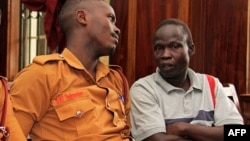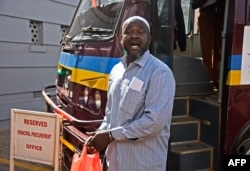It has been 10 years since Uganda set up its International Crimes Division. The ICD is a court meant to try cases involving war crimes, crimes against humanity and genocide, all of which have allegedly happened on Ugandan soil during the past 30 years. However, the effectiveness of this court to provide justice is still under question.
Uganda's International Crimes Division was created after peace talks to end the 20-year war between the government and the rebel Lord's Resistance Army.
The ICD was designed to complement the International Criminal Court in the Hague that has issued arrest warrants for top LRA figures, such as the group's leader Joseph Kony.
But since its inception the court has convicted only six people on terrorism charges, all related to the murder of Muslims.
Only one ongoing case deals with an LRA member, Thomas Kwoyelo, who was arrested nine years ago in Congo and goes on trial next month.
ICD registrar Harriet Ssali says the division faces major challenges, especially the sheer number of cases it is expected to handle.
“Uganda is dealing with hundreds of thousands of cases for all Ugandans. You cannot say I am trying Kwoyelo, because of the war crimes he committed and you do not try the other 10,000 defilement cases, murder cases, rape cases. The whole of Uganda needs justice,” said Ssali.
The ICD is currently holding a pre-trial session for Jamil Mukulu, the leader of another rebel group, the rebel Allied Democratic Forces.
During the court session Monday, the prosecution team asked for a two week adjournment to analyze evidence they received from Tanzania.
Legal expert Wandera Ogaalo says the ICD is still lacking in the investigations department.
“We have not had specialized investigators in this field. They are handling them like they handle them ordinary cases," Ogaalo. "Keep in mind they are crimes against humanity, genocide. These are specialized crimes which we did not have in our penal code. So how would you expect our policemen to investigate them properly?”
Another obstacle to ICD operations is a 2000 law, known as the Amnesty Act. The act was aimed at ending violence and restoring peace by giving combatants an incentive to lay down their weapons.
Kwoyelo tried to claim amnesty in an attempt to escape being prosecuted, but this was overruled by the Supreme Court in 2015.
Some members of the ADF being tried by the same court say government officials have encouraged them to claim amnesty.
Ssali says the ICD is open to the Amnesty Act, but it must be used through the right procedure and can only apply to non-combatants.
“The first Amnesty Act had a problem. It was granting blanket amnesty and it was not explaining under which circumstances you can actually apply for amnesty. People got excited, they wanted to end the war in the north. They just said; we shall grant you amnesty if you drop your weapons. But that is not applicable to everybody,” said Ssali.
Lawmakers are considering an update to the Act to clarify who can claim amnesty, but the bill has languished in parliament since 2015.






